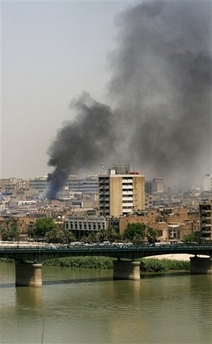BAGHDAD, Iraq - A series of bombings and shootings killed
at least 31 people in Baghdad and other parts of Iraq on Tuesday as more US
troops were seen in the capital as part of a campaign to reduce Sunni-Shiite
violence that threatens civil war.
Ten people died and eight were injured when three bombs exploded
simultaneously near the Interior Ministry buildings in central Baghdad, police
Lt. Bilal Ali Majid said.
|

Smoke billows after a bomb blast in a market
in Baghdad, Iraq, Tuesday Aug. 8, 2006. Two roadside bombs exploded in the
main Shurja market in central Baghdad within minutes of each other,
killing 10 people and injuring 50, said police. Meanwhile, Iraq's prime
minister sharply criticized a US-Iraqi attack on a Shiite militia
stronghold in Baghdad, exposing a rift with his American partners on
security tactics. [AP]
|
A couple of hours later, two roadside bombs ripped through the main Shurja
market, also in central Baghdad, killing 10 civilians and injuring 50, said
police Lt. Mohammed Kheyoun.
The blasts were the latest sign of the security crisis, which prompted US
commanders to bolster the American troop presence in the city. More US troops
were seen Tuesday patrolling the streets of the Ghazaliyah neighborhood, a
mostly Sunni area and among the most violent parts of the capital.
Nonetheless, violence continued.
Gunmen in two cars stormed a bank Tuesday in the Azamiyah district, killing
three bank employees before fleeing with 8 million dinars (US$5,500; euro4,200),
according to the Iraqi Defense Ministry.
Two Sunni bothers were slain in their car repair shop in southwestern Baghdad
and four Shiites were gunned down in a series of attacks in Baqouba and
Muqdadiyah, two cities in Diyala province northeast of Baghdad, police said.
A policeman was killed in a bombing in the northern city of Tikrit and a
police sergeant was shot dead in his car in Baghdad, police sai.
Police also found two bodies, both shot in the head, in Sulla in northwest
Baghdad on Tuesday.
US officials fear progress elsewhere in Iraq will be undermined as long as
the security situation in Baghdad remains precarious. US and Iraqi forces have
launched a new bid to reclaim the streets from Sunni and Shiite extremists after
Prime Minister Nouri al-Maliki's security plan for Baghdad failed to stem the
violence.
But rifts have appeared between Iraq's government and American forces on how
to deal with the crisis, especially the Mahdi Army militia of radical cleric
Muqtada al-Sadr. His militiamen have been blamed for several reprisal attacks
against Sunnis.
On Monday, al-Maliki sharply criticized a US-Iraqi attack on Mahdi Army's
stronghold in Baghdad's Sadr City area that left three people dead including a
child. The U.S. command said the raid was to capture "individuals involved in
punishment and torture cell activities."
President Jalal Talabani, a Kurd, met Monday with the top US commander in
Iraq, Gen. George W. Casey Jr., to discuss security. Talabani said he told Casey
that "it is in no one's interest" to force a showdown with al-Sadr, a key
supporter of al-Maliki, also a Shiite.
In a television broadcast late Monday, al-Maliki said he was "very angered
and pained" by the operation, warning that it could undermine his efforts toward
national reconciliation.
"Reconciliation cannot go hand in hand with operations that violate the
rights of citizens this way," al-Maliki said. He apologized to the Iraqi people
for the operation and said "this won't happen again."
For his part, al-Sadr urged his militiamen to be "calm and patient, and avoid
being drawn into civil war." Mohammed al-Fartousi, an al-Sadr aide, said the
young cleric urged his followers to purge their ranks of those who bring the
Mahdi Army into disrepute and to refrain from atacking Sunni mosques and killing
"innocent people."
Also Tuesday, police said two Iraqi journalists were killed in separate
incidents in Baghdad. They are among more than 100 Iraqi and foreign media
workers slain here since the US-led invasion of 2003.